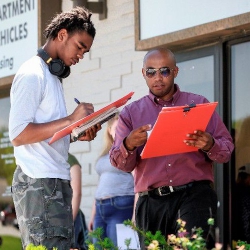Those circulating a Nebraska petition to set up a November 8 statewide referendum on casino gambling have met a high rejection rate. In one county, nearly 40% of all signatures have been kicked off the list, leading to concerns that the casino initiative might not have enough signatures to trigger a referendum.
Rejection rates in Nebraska’s two largest counties, Douglas and Lancaster, appear to be at the heart of the matter. That is where officials have rejected the largest percentage of the petition’s signatures.
Scott Lautenbaugh on Disqualification
Former State Sen. Scott Lautenbaugh of Omaha, who acts as a spokesman for proponents of casino gambling, said to the Omaha World-Herald, “That sounds like an unbelievably high rejection rate. Our own verification was showing that our cushion was small, but we thought it was sufficient.”
“Keep the Money in Nebraska” is the public policy group seeking the referendum. The group collected over 130,000 signatures on its petition. To get the initiative on the ballot in November, the group needed 117,000 verified signatures.
38% Disqualification Rate in Douglas County
52,995 of those signatures came in Douglas County, which contains the state’s largest city, Omaha. It made sense to collect so many signatures in a population center, but concentrating in one county also gave Douglas County officials tremendous sway in whether a casino referendum would happen.
So far, 38% of all signatures in Douglas County have been struck off the list. The high rate of nullification has put the casino referendum in doubt. Scott Lautenbaugh said his group is seeking to learn what caused that high level of discrepencies.
Public Records Request
To do that, Lautenbaugh’s group mailed a letter to the Nebraska Secretary of State’s Office, submitting a public records request. Rumors about the high level of rejections prompted the request, because the group wants to know how legitimate these attempts at nullification are.
Scott Lautenbaugh told the local newspaper, “That sounds like an unbelievably high rejection rate. Our own verification was showing that our cushion was small, but we thought it was sufficient. We just want to figure out how this (high rejection rate) could possibly happen.”
Election Commissioners Discuss Verification Process
Lancaster County Election Commissioner Dave Shively and Douglas County Election Commissioner Brian Kruse each have said they are using the same methods of verification and disqualification that have been used in years past. The verification process is expected to be finished by Friday. In some states, if a petition falls short due to disqualifications, the petitioners are given an additional month to raise more signatures. That does not appear to be the case in Nebraska.
A spokeswoman with the Secretary of State’s Office, Laura Strimple, said she was unaware if other Nebraska counties have reported a similar disqualification rate. If a persistant pattern of disqualifications happened, then it might be evidence that the signatures were collected in a suspicious fashion. No doubt, a certain number of fake signatures appear on all large petitions, because signees might not want to give their real name or simply enjoy pranking solicitors.
Voter Nullification
Voter nullification is a rising phenomenon in the United States. In the landmark 2013 case, Shelby County v. Holder, the U.S. Supreme Court struck down key provisions in the 1965 Civil Rights Act. The decision meant that states have a much higher ability to determine citizens cannot vote.
Reports centered around the 2014 mid-term elections showed that 8 U.S. states, mostly in the American South, used the new ruling to cast out thousands upon thousands of votes cast by U.S. citizens. In some cases, state officials ruled that voter registration only applied to federal elections, and voters needed to register for state and local elections separately. Since such decisions were not made known to the public, officials could pick-and-choose which votes they accepted.
Arizona v. The Inter Tribal Council
Also in 2013, the U.S. Supreme Court made another landmark decision on voting rights in the Arizona v. The Inter Tribal Council of Arizona case. That case upheld state’s rights to create a high bar for registration–so-called “proof of citizenship” laws–involving documents of proof that about 7% of residents might not be able to acquire. Arizona and Kansas have used the decision to keep Hispanic citizens from voting–or at least having their vote count.
The infamous Joseph Stalin once said, “It doesn’t matter who votes; it matters who counts the votes.”
Stalin was referring to the elections his agents rigged in 7 Eastern European nations, which were used to legitimize communist rule. In this case, it might not matter who signs a petition, but who approves the signatures on the petition.

